Charles E W Bean, Diaries, AWM38 3DRL 606/243A/1 - 1916 - 1934 - Part 3
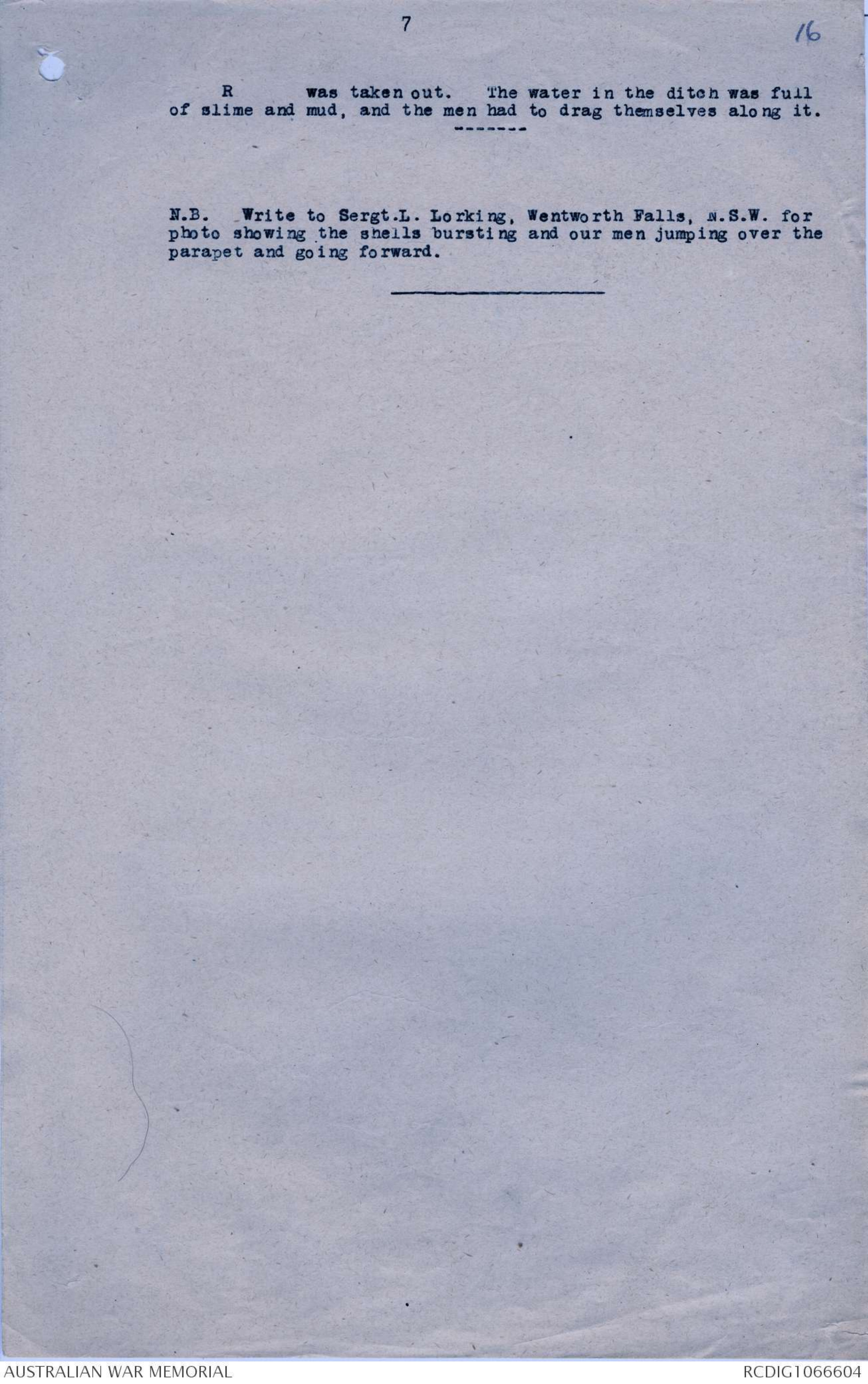
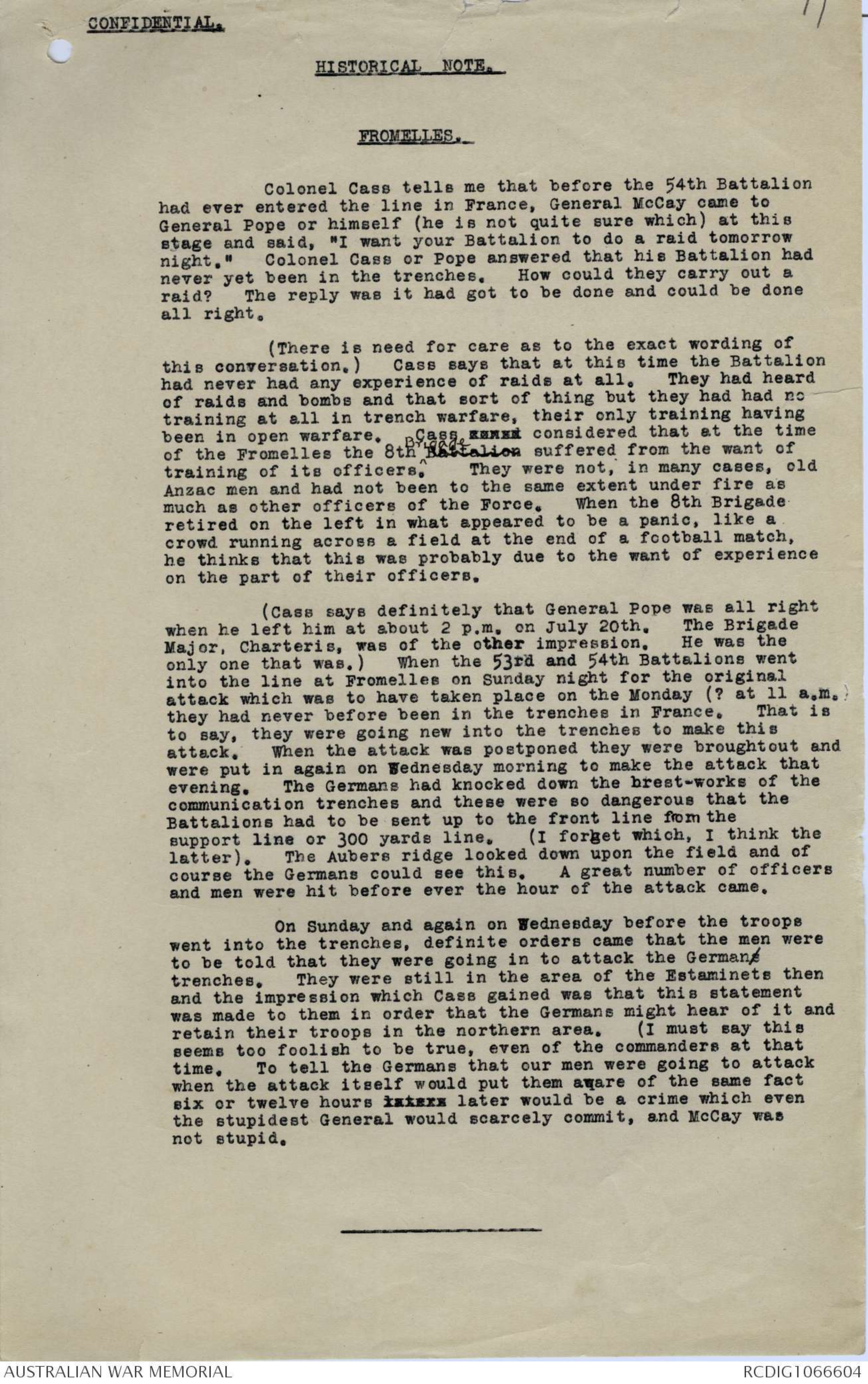
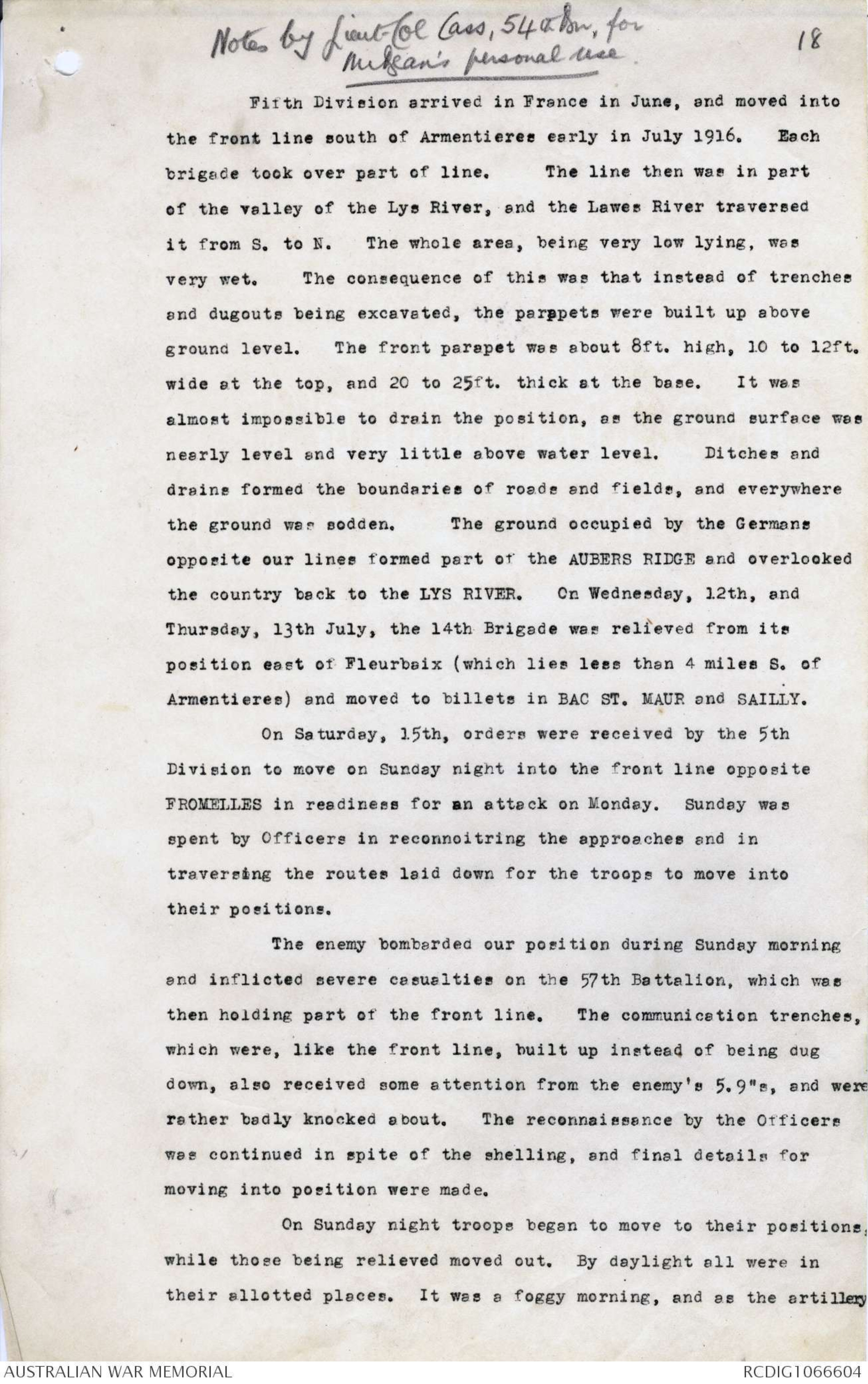
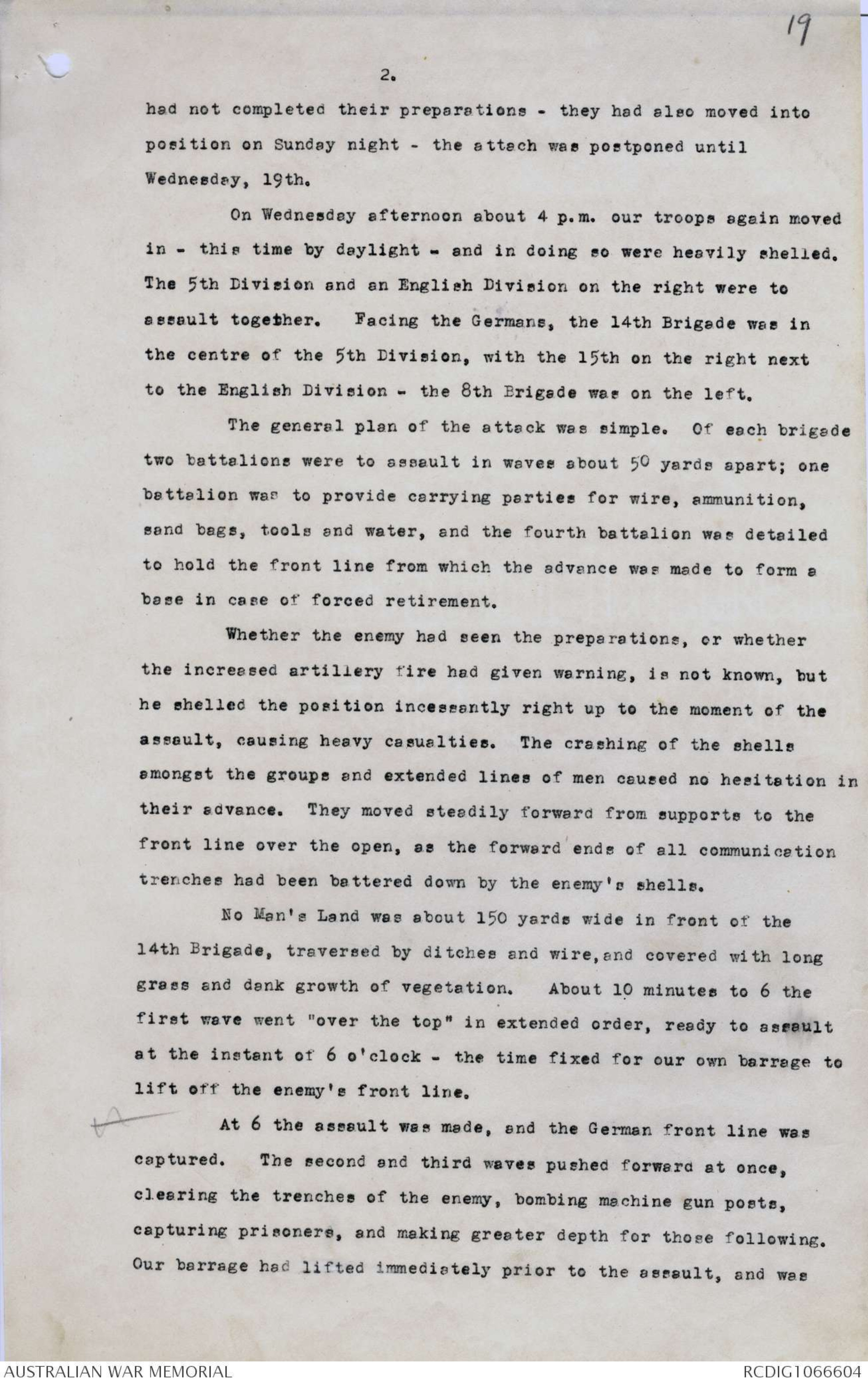
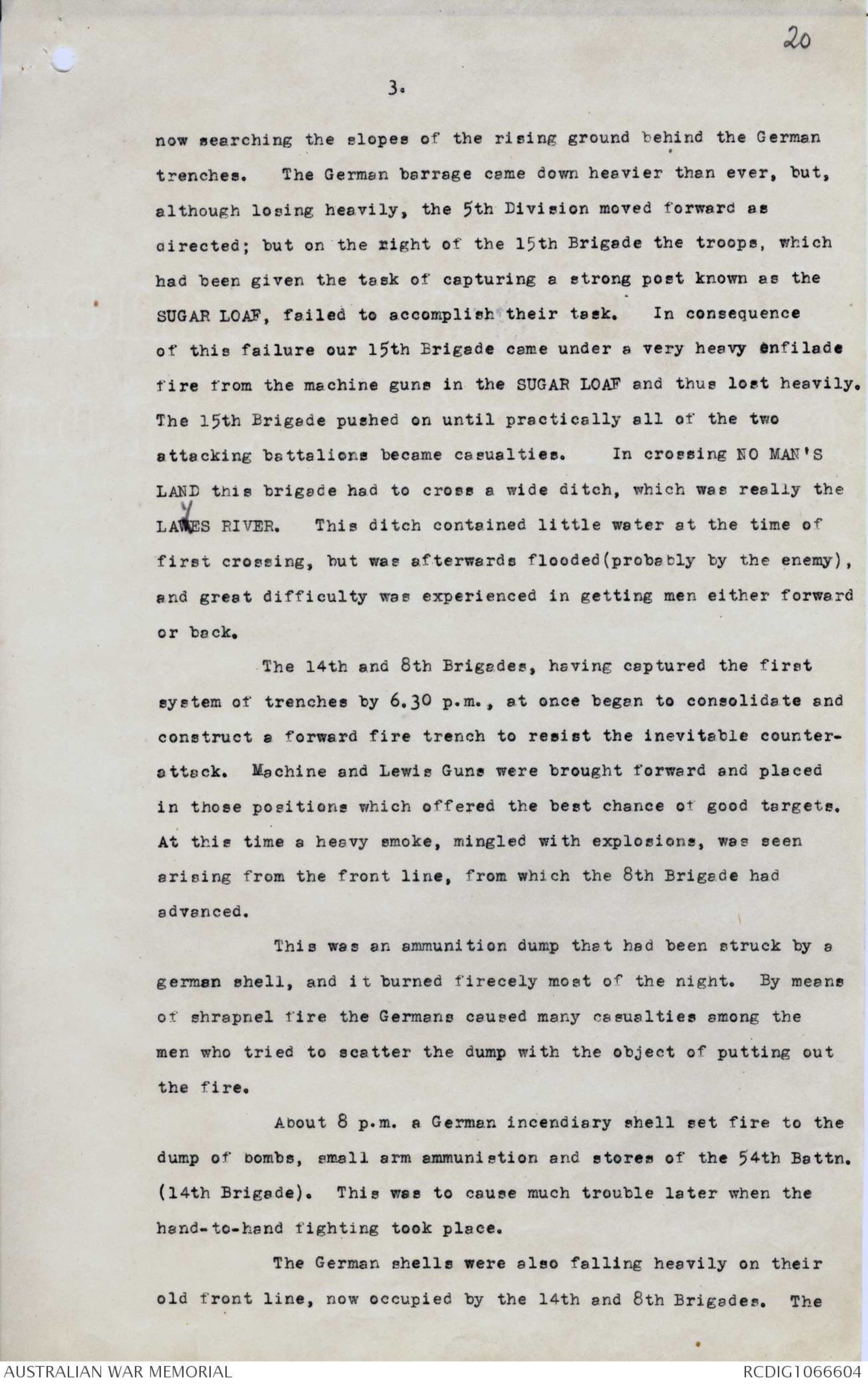
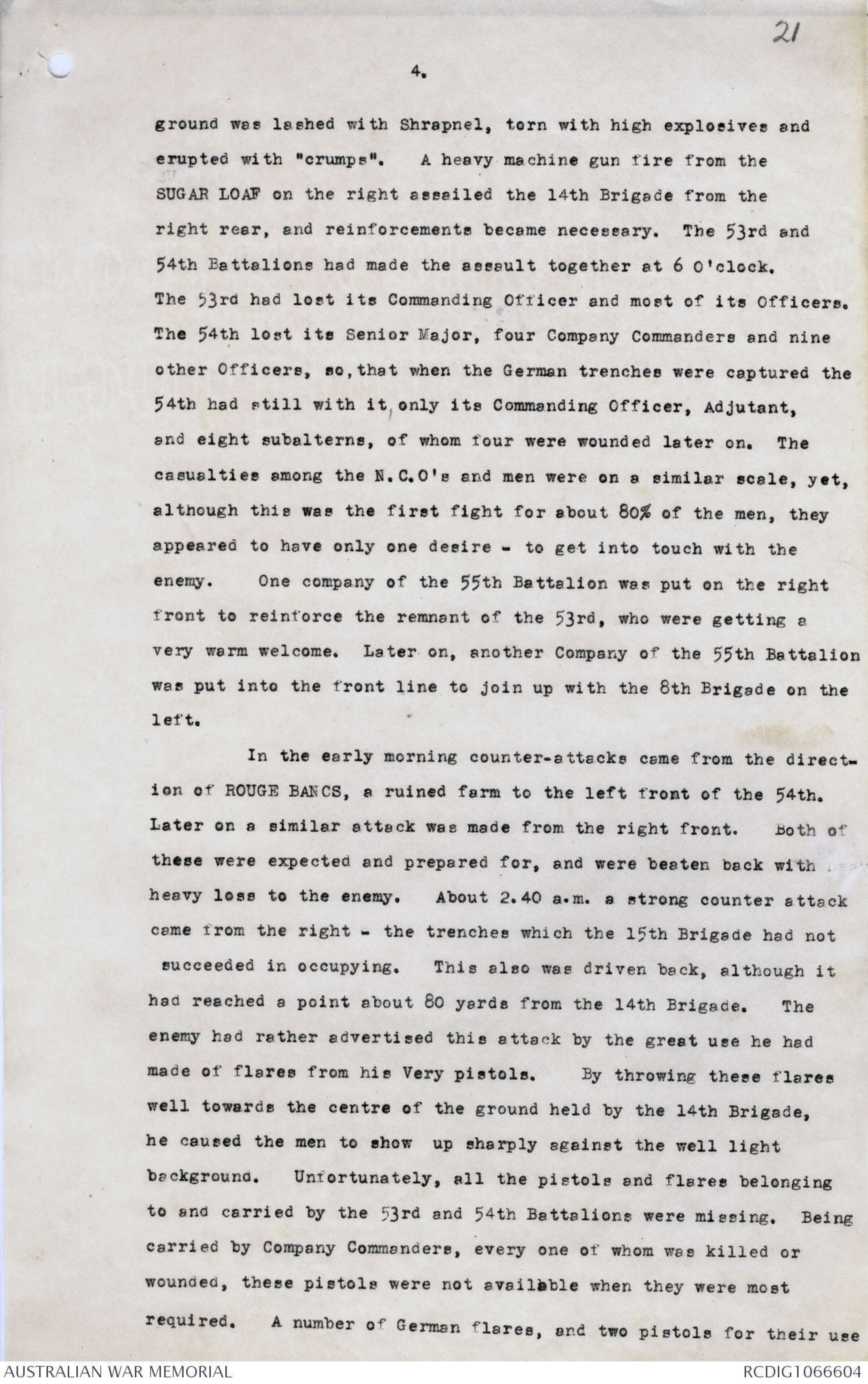
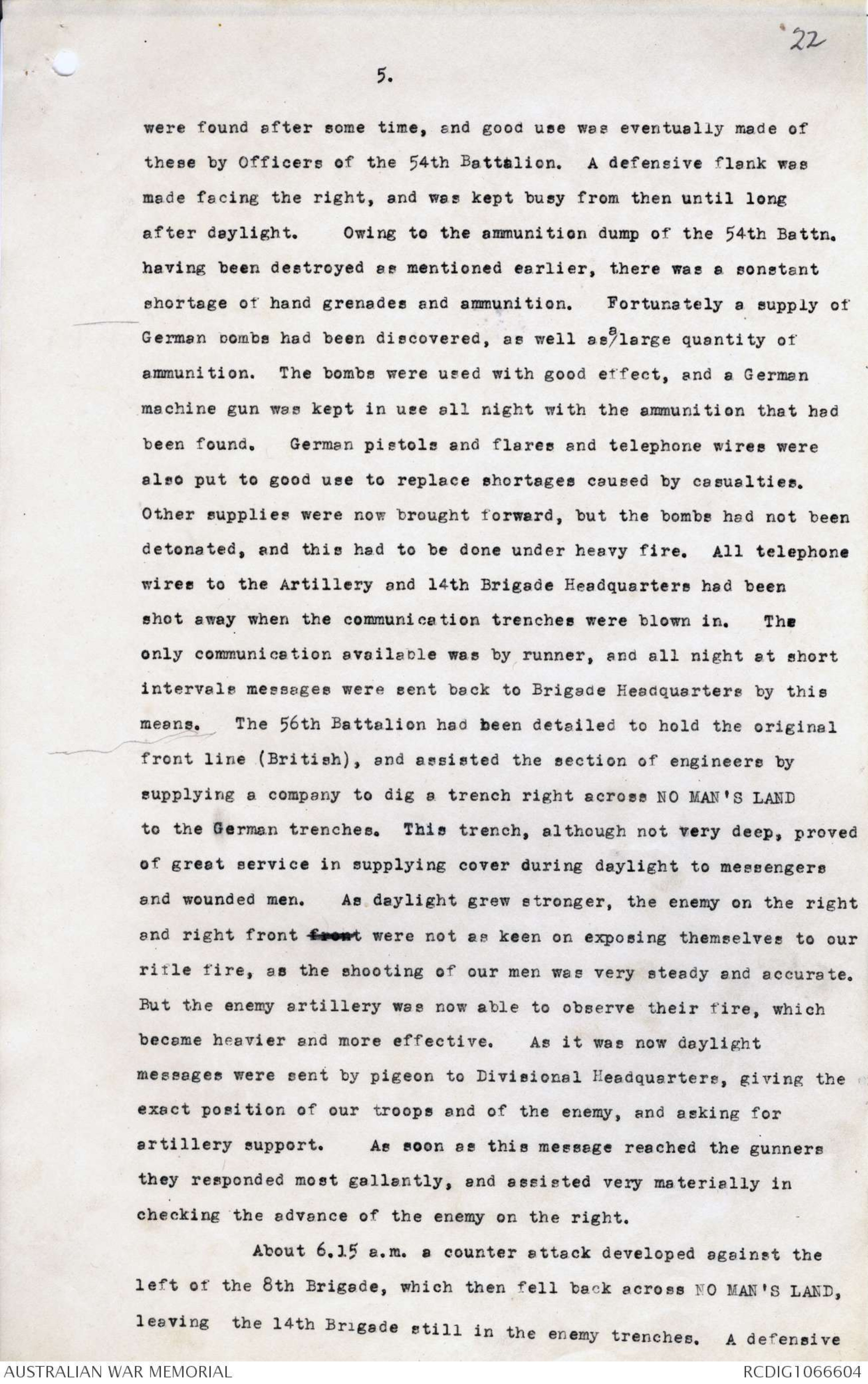
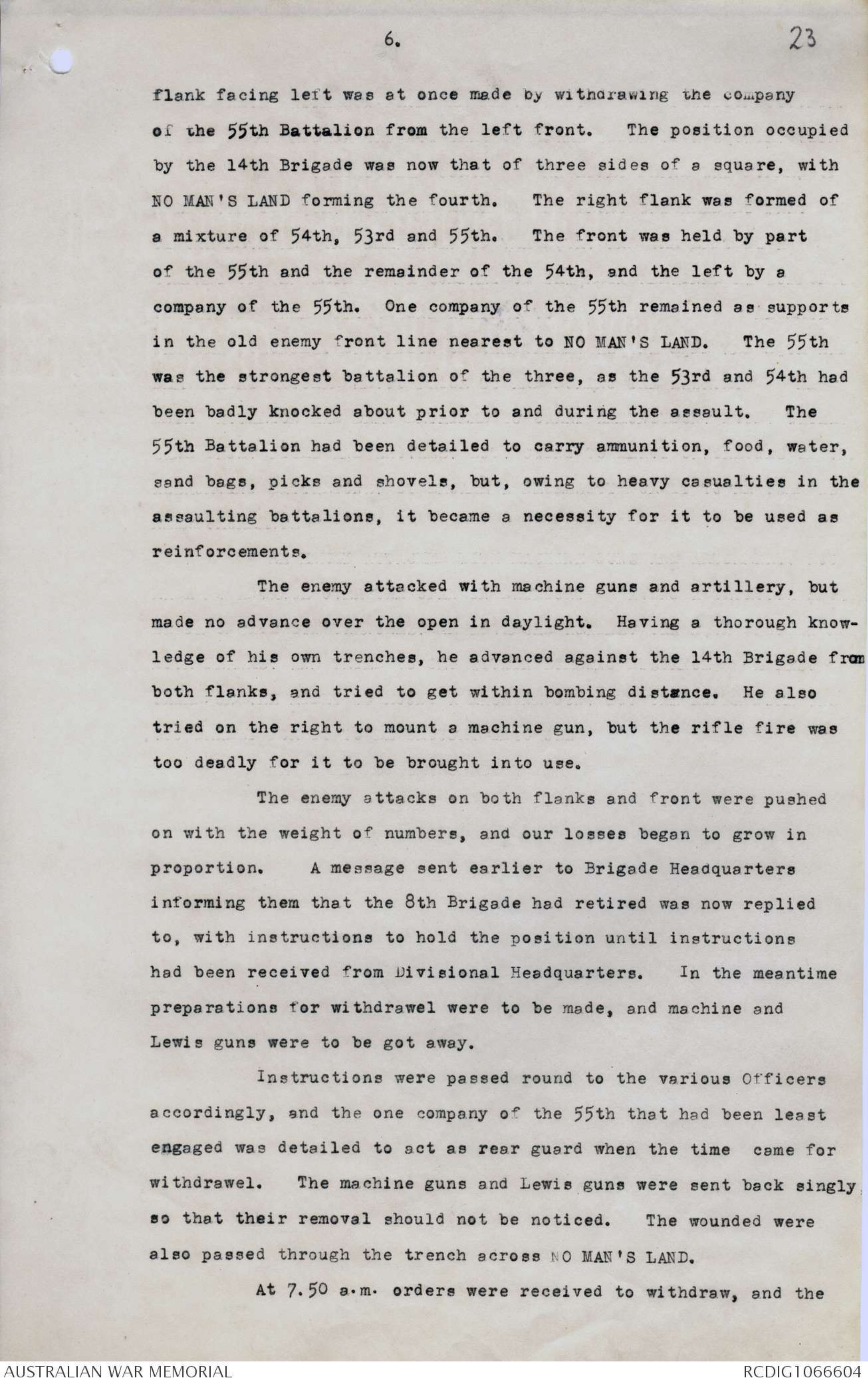


7 16
R was taken out. The water in the ditch was full
of slime and mud, and the men had to drag themselves along it.
N.B. Write to Sergt.L. Lorking, Wentworth Falls, N.S.W. for
photo showing the shells bursting and our men jumping over the
parapet and going forward.
CONFIDENTIAL 11
HISTORICAL NOTE.
FROMELLES,
Colonel Cass tells me that before the 54th Battalion
had ever entered the line in France, General McCay came to
General Pope or himself (he is not quite sure which) at this
stage and said, "I want your Battalion to do a raid tomorrow
night." Colonel Cass or Pope answered that his Battalion had
never yet been in the trenches. How could they carry out a
raid? The reply was it had got to be done and could be done
all right.
(There is need for care as to the exact wording of
this conversation.) Cass says that at this time the Battalion
had never had any experience of raids at all. They had heard
of raids and bombs and that sort of thing but they had had no
training at all in trench warfare, their only training having
been in open warfare. Cass xxxxx considered that at the time
of the Fromelles the 8th Brigade Battalion suffered from the want of
training of its officers. They were not, in many cases, old
Anzac men and had not been to the same extent under fire as
much as other officers of the Force. When the 8th Brigade
retired on the left in what appeared to be a panic, like a
crowd running across a field at the end of a football match,
he thinks that this was probably due to the want of experience
on the part of their officers.
(Cass says definitely that General Pope was all right
when he left him at about 2 p.m. on July 20th. The Brigade
Major, Charteris, was of the other impression. He was the
only one that was.) When the 53rd and 54th Battalions went
into the line at Fromelles on Sunday night for the original
attack which was to have taken place on the Monday (? at 11 a.m.
they had never before been in the trenches in France. That is
to say, they were going new into the trenches to make this
attack. When the attack was postponed they were broughtout and
were put in again on Wednesday morning to make the attack that
evening. The Germans had knocked down the brest-works of the
communication trenches and these were so dangerous that the
Battalions had to be sent up to the front line for the
support line or 300 yards line. (I forget which, I think the
latter). The Aubers ridge looked down upon the field and of
course the Germans could see this. A great number of officers
and men were hit before ever the hour of the attack came.
On Sunday and again on Wednesday before the troops
went into the trenches, definite orders came that the men were
to be told that they were going in to attack the Germans
trenches. They were still in the area of the Estaminets then
and the impression which Cass gained was that this statement
was made to them in order that the Germans might hear of it and
retain their troops in the northern area. (I must say this
seems too foolish to be true, even of the commanders at that
time. To tell the Germans that our men were going to attack
when the attack itself would put them aware of the same fact
six or twelve hours xxxxxx later would be a crime which even
the stupidest General would scarcely commit, and McCay was
not stupid.
Notes by Lieut-Col Cass, 54th Bn, for
Mr Bean's personal use 18
Fifth Division arrived in France in June, and moved into
the front line south of Armentieres early in July 1916. Each
brigade took over part of line. The line then was in part
of the valley of the Lys River, and the Lawes River traversed
it from S. to N. The whole area, being very low lying, was
very wet. The consequence of this was that instead of trenches
and dugouts being excavated, the parapets were built up above
ground level. The front parapet was about 8ft. high, 10 to 12ft.
wide at the top, and 20 to 25ft. thick at the base. It was
almost impossible to drain the position, as the ground surface was
nearly level and very little above water level. Ditches and
drains formed the boundaries of roads and fields, and everywhere
the ground was sodden. The ground occupied by the Germans
opposite our lines formed part of the AUBERS RIDGE and overlooked
the country back to the LYS RIVER. On Wednesday, 12th, and
Thursday, 13th July, the 14th Brigade was relieved from its
position east of Fleurbaix (which lies less than 4 miles S. of
Armentieres) and moved to billets in BAC ST. MAUR and SAILLY.
On Saturday, 15th, orders were received by the 5th
Division to move on Sunday night into the front line opposite
FROMELLES in readiness for an attack on Monday. Sunday was
spent by Officers in reconnoitring the approaches and in
traversing the routes laid down for the troops to move into
their positions.
The enemy bombarded our position during Sunday morning
and inflicted severe casualties on the 57th Battalion, which was
then holding part of the front line. The communication trenches,
which were, like the front line, built up instead of being dug
down, also received some attention from the enemy's 5.9"s, and were
rather badly knocked about. The reconnaissance by the Officers
was continued in spite of the shelling, and final details for
moving into position were made.
On Sunday night troops began to move to their positions,
while those being relieved moved out. By daylight all were in
their allotted places. It was a foggy morning, and as the artillery
19
2.
had not completed their preparations - they had also moved into
position on Sunday night - the attach was postponed until
Wednesday, 19th.
On Wednesday afternoon about 4 p.m. our troops again moved
in - this time by daylight - and in doing so were heavily shelled.
The 5th Division and an English Division on the right were to
assault together. Facing the Germans, the 14th Brigade was in
the centre of the 5th Division, with the 15th on the right next
to the English Division - the 8th Brigade was on the left.
The general plan of the attack was simple. Of each brigade
two battalions were to assault in waves about 50 yards apart; one
battalion was to provide carrying parties for wire, ammunition,
sand bags, tools and water, and the fourth battalion was detailed
to hold the front line from which the advance was made to form a
base in case of forced retirement.
Whether the enemy had seen the preparations, or whether
the increased artillery fire had given warning, is not known, but
he shelled the position incessantly right up to the moment of the
assault, causing heavy casualties. The crashing of the shells
amongst the groups and extended lines of men caused no hesitation in
their advance. They moved steadily forward from supports to the
front line over the open, as the forward ends of all communication
trenches had been battered down by the enemy's shells.
No Man's Land was about 150 yards wide in front of the
14th Brigade, traversed by ditches and wire, and covered with long
grass and dank growth of vegetation. About 10 minutes to 6 the
first wave went "over the top" in extended order, ready to assault
at the instant of 6 o'clock - the time fixed for our own barrage to
lift off the enemy's front line.
At 6 the asssult was made, and the German front line was
captured. The second and third waves pushed forward at once,
clearing the trenches of the enemy, bombing machine gun posts,
capturing prisoners, and making greater depth for those following.
Our barrage had lifted immediately prior to the assault, and was
20
3.
now searching the slopes of the rising ground behind the German
trenches. The German barrage came down heavier than ever, but,
although losing heavily, the 5th Division moved forward as
directed; but on the right of the 15th Brigade the troops, which
had been given the task of capturing a strong post known as the
SUGAR LOAF, failed to accomplish their task. In consequence
of this failure our 15th Brigade came under a very heavy enfilade
fire from the machine guns in the SUGAR LOAF and thus lost heavily.
The 15th Brigade pushed on until practically all of the two
attacking battalions became casualties. In crossing NO MAN'S
LAND this brigade had to cross a wide ditch, which was really the
LAWYES RIVER. This ditch contained little water at the time of
first crossing, but was afterwards flooded (probably by the enemy),
and great difficulty was experienced in getting men either forward
or back.
The 14th and 8th Brigades, having captured the first
system of trenches by 6.30 p.m., at once began to consolidate and
construct a forward fire trench to resist the inevitable counter-attack.
Machine and Lewis Guns were brought forward and placed
in those positions which offered the best chance of good targets.
At this time a heavy smoke, mingled with explosions, was seen
arising from the front line, from which the 8th Brigade had
advanced.
This was an ammunition dump that had been struck by a
german shell, and it burned firecely most of the night. By means
of shrapnel fire the Germans caused many casualties among the
men who tried to scatter the dump with the object of putting out
the fire.
About 8 p.m. a German incendiary shell set fire to the
dump of bombs, small arm ammunistion and stores of the 54th Battn.
(14th Brigade). This was to cause much trouble later when the
hand-to-hand fighting took place.
The German shells were also falling heavily on their
old front line, now occupied by the 14th and 8th Brigades. The
21
4.
ground was lashed with Shrapnel, torn with high explosives and
erupted with "crumps". A heavy machine gun fire from the
SUGAR LOAF on the right assailed the 14th Brigade from the
right rear, and reinforcements became necessary. The 53rd and
54th Battalions had made the assault together at 6 O'clock.
The 53rd had lost its Commanding Officer and most of its Officers.
The 54th lost its Senior Major, four Company Commanders and nine
other Officers, so, that when the German trenches were captured the
54th had still with it, only its Commanding Officer, Adjutant,
and eight subalterns, of whom four were wounded later on. The
casualties among the N.C.O's and men were on a similar scale, yet,
although this was the first fight for about 80% of the men, they
appeared to have only one desire - to get into touch with the
enemy. One company of the 55th Battalion was put on the right
front to reinforce the remnant of the 53rd, who were getting a
very warm welcome. Later on, another Company of the 55th Battalion
was put into the front line to join up with the 8th Brigade on the
left.
In the early morning counter-attacks came from the direction
of ROUGE BANCS, a ruined farm to the left front of the 54th.
Later on a similar attack was made from the right front. Both of
these were expected and prepared for, and were beaten back with
heavy loss to the enemy. About 2.40 a.m. a strong counter attack
came from the right - the trenches which the 15th Brigade had not
succeeded in occupying. This also was driven back, although it
had reached a point about 80 yards from the 14th Brigade. The
enemy had rather advertised this attack by the great use he had
made of flares from his Very pistols. By throwing these flares
well towards the centre of the ground held by the 14th Brigade,
he caused the men to show, up sharply against the well light
background. Unfortunately, all the pistols and flares belonging
to and carried by the 53rd and 54th Battalions were missing. Being
carried by Company Commanders, every one of whom was killed or
wounded, these pistols were not available when they were most
required. A number of German flares, and two pistols for their use
22
5.
were found after some time, and good use was eventually made of
these by Officers of the 54th Battalion. A defensive flank was
made facing the right, and was kept busy from then until long
after daylight. Owing to the ammunition dump of the 54th Battn.
having been destroyed as mentioned earlier, there was a sonstant
shortage of hand grenades and ammunition. Fortunately a supply of
German bombs had been discovered, as well as ^a large quantity of
ammunition. The bombs were used with good effect, and a German
machine gun was kept in use all night with the ammunition that had
been found. German pistols and flares and telephone wires were
also put to good use to replace shortages caused by casualties.
Other supplies were now brought forward, but the bombs had not been
detonated, and this had to be done under heavy fire. All telephone
wires to the Artillery and 14th Brigade Headquarters had been
shot away when the communication trenches were blown in. The
only communication available was by runner, and all night at short
intervals messages were sent back to Brigade Headquarters by this
means. The 56th Battalion had been detailed to hold the original
front line (British), and assisted the section of engineers by
supplying a company to dig a trench right across NO MAN'S LAND
to the German trenches. This trench, although not very deep, proved
of great service in supplying cover during daylight to messengers
and wounded men. As daylight grew stronger, the enemy on the right
and right front front were not as keen on exposing themselves to our
rifle fire, as the shooting of our men was very steady and accurate.
But the enemy artillery was now able to observe their fire, which
became heavier and more effective. As it was now daylight
messages were sent by pigeon to Divisional Headquarters, giving the
exact position of our troops and of the enemy, and asking for
artillery support. As soon as this message reached the gunners
they responded most gallantly, and assisted very materially in
checking the advance of the enemy on the right.
About 6.15 a.m. a counter attack developed against the
left of the 8th Brigade, which then fell back across NO MAN'S LAND,
leaving the 14th Brigade still in the enemy trenches. A defensive
6. 23
flank facing left was at once made by withdrawing the company
of the 55th Battalion from the left front. The position occupied
by the 14th Brigade was now that of three sides of a square, with
NO MAN'S LAND forming the fourth. The right flank was formed of
a mixture of 54th, 53rd and 55th. The front was held by part
of the 55th and the remainder of the 54th, and the left by a
company of the 55th. One company of the 55th remained as supports
in the old enemy front line nearest to NO MAN'S LAND. The 55th
was the strongest battalion of the three, as the 53rd and 54th had
been badly knocked about prior to and during the assault. The
55th Battalion had been detailed to carry ammunition, food, water,
sand bags, picks and shovels, but, owing to heavy casualties in the
assaulting battalions, it became a necessity for it to be used as
reinforcements.
The enemy attacked with machine guns and artillery, but
made no advance over the open in daylight. Having a thorough knowledge
of his own trenches, he advanced against the 14th Brigade from
both flanks, and tried to get within bombing distance. He also
tried on the right to mount a machine gun, but the rifle fire was
too deadly for it to be brought into use.
The enemy attacks on both flanks and front were pushed
on with the weight of numbers, and our losses began to grow in
proportion. A message sent earlier to Brigade Headquarters
informing them that the 8th Brigade had retired was now replied
to, with instructions to hold the position until instructions
had been received from Divisional Headquarters. In the meantime
preparations for withdrawel were to be made, and machine and
Lewis guns were to be got away.
Instructions were passed round to the various Officers
accordingly, and the one company of the 55th that had been least
engaged was detailed to act as rear guard when the time came for
withdrawel. The machine guns and Lewis guns were sent back singly
so that their removal should not be noticed. The wounded were
also passed through the trench across NO MAN'S LAND.
At 7.50 a.m. orders were received to withdraw, and the
7. 24
front and flanks were gradually depleted of their men. A sudden
rush by the enemy on the left flank broke in, and the Germans
crowded into the trench, thus getting between the front and rear
lines of the defence. As soon as this was seen, the front line of
the 14th Brigade turned about and charged with the bayonet. Few
Germans escaped this charge. The fire from the enemy's guns was now
concentrating on NO MAN'S LAND, and the British front line, to which
the 14th Brigade was withdrawing, as well as on the German trenches
still occupied by the 14th Brigade.
Gradually the remnants of the 53rd, 54th and 55th were
withdrawn, most of them passing through the trench across NO MAN'S
LAND dug during the night by the 56th. The enemy concentrated
his artillery fire on the end of this trench where it cut through
our parapet. Luckily, the destruction of their telephone wires
prevented the correction to the range, and most of the shells
passed over it and hit the parapet 8 or 10 yards further on,
although now and then a shell struck the trench and caused casualties.
The removal of these casualties necessarily caused delays,
and some of the men in the shallow open trench decided to "chance
it". They got out of the trench and made a wild dash for our parapet.
Just as they climbed to the top a German machine gun swept
on them and killed one Officer and wounded another badly. The few
men who had made the rush dropped into shelter untouched. The men
in the trench moved forward again - it was a very shallow trench,
in places only about 18 inches deep, with a small parapet about
one foot high on each side.
Slowly, and after many narrow escapes, the survivors
reached our own front line trenches, only to find them searched and
lashed with high explosives and shrapnel shell. The communication
trenches leading to the support lines no longer existed as trenches.
Smashed and pounded as they had been by the enemy, they had collapsed
and no longer offered shelter to those attempting to move
through them.
The wounded received first aid in our front line, but
could not be carried away for some hours. The Medical Officers
moved forward to the front line to render first aid on the spot,
25
8.
and awaited the opportunity to get the wounded away.
By 9 a.m. all the survivors who could move had regained
our front line, and then the remnants of the 53rd and 54th were
ordered to make their way back to billets. The enemy still bombarded
the front and support lines, as well as communication
trenches, and as the troops were withdrawn they continued to suffer
casualties.
It must not be supposed that our own guns were silent,
but practically all our telephone wires to the front line had been
cut again and again almost as fast as repairs could be effected.
The forward Observing Officers of the artillery were therefore very
much handicapped in communicating the results of their fire to
the guns, and in consequence could not support the infantry as they
would have wished. The enemy on the ridge opposite was able to
post observers in many places that gave direct view over our lines,
and his shooting was consequently much more accurate.
The casualties in the Division were very heavy, and
especially so in the 15th and 15th14th Brigades. The 53rd lost about
600 all told - the 54th very few less.
 Sandy Mudie
Sandy MudieThis transcription item is now locked to you for editing. To release the lock either Save your changes or Cancel.
This lock will be automatically released after 60 minutes of inactivity.